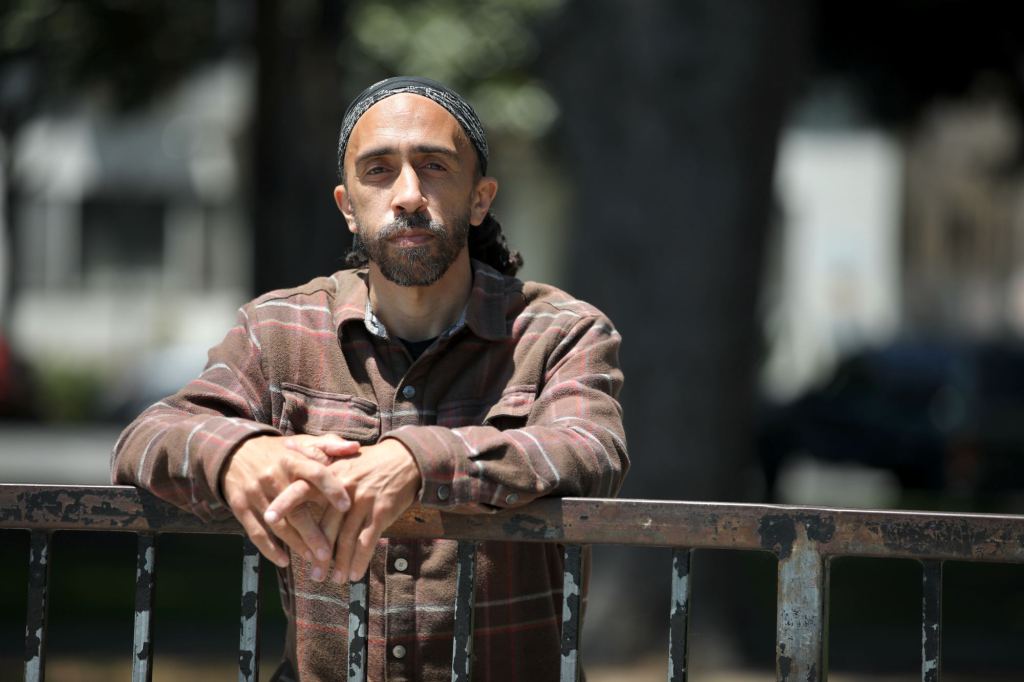
The Department of Homeland Security is targeting several social-media accounts that posted a video of a Border Patrol agent — with an activist behind one of the accounts questioning if the federal government is trying to suppress free speech.
Sherman Austin, who lives in Long Beach and is the creator and programmer of the Stop ICE Raids Alert Network, received a message from Meta on Sept. 5 that said a law enforcement agency was seeking information about his Instagram account.
Back in February Austin created Stop ICE, a website that relies on crowd-sourced information to alert users to immigration activity in their communities across the country.
After obtaining a copy of the subpoena, Austin learned that the Department of Homeland Security requested information about several Instagram accounts for a criminal investigation, including his.
Austin said he thinks this is an attempt by the government to chill his and other activists’ efforts of documenting and publicly sharing photos, videos, and information about federal immigration agents and their activities.
“They want to use it as an example to like set a precedent and start going after activists and organizations that are speaking up about, you know, ICE ( U.S. Immigration and Customs Enforcement) raids going on in the community,” Austin said.
“This is not going to deter me in any way, any shape or form,” he said. “I’m not doing anything illegal.”
The redacted subpoena, which Austin shared with the Southern California News Group, says it is about “Officer Safety/Doxing: (and names the agent).”
On Sept. 2, six Instagram accounts, including Stop ICE’s, collaborated on a post dedicated to the Border Patrol agent.
The reel includes photos and videos of the unmasked uniformed agent involved in various federal immigration operations across Southern California and information about the agent’s previous employment at a police department, his hometown, his city of residence, and his name.
Representatives of only one of the five other accounts contacted by a reporter answered, saying that account did not receive the subpoena.
“When I saw [the subpoena], I kind of laughed ’cause it was like, first of all, everything in that post was already publicly available,” Austin said. “It was publicly on Border Patrol videos like flaunting about how they go about and they arrest people. …
“[The information] wasn’t re-posted telling people to like go after him, or it wasn’t re-posted with the intent to like encourage people to attack him in any other way,” Austin said. “It’s clearly him and them trying to go after people over a First Amendment issue.”
The Department of Homeland Security did not respond to multiple requests for comment and questions about how the agency defines doxing.
In previous public statements, DHS’ spokesperson Tricia McLaughlin told the Center for Media and Democracy, “Videotaping ICE law enforcement and posting photos and videos of them online is doxing our agents. … We will prosecute those who illegally harass ICE agents to the fullest extent of the law.”
DHS officials have repeatedly stated that their agents have experienced a drastic increase in assaults and harassment. DHS did not respond to questions about those purported assaults.
Previously, an ICE spokesman said: “U.S. Immigration and Customs Enforcement fully respects the constitutional rights of all people to peacefully express their opinions. That being said, ICE remains committed to performing its immigration-enforcement mission consistent with federal law and agency policy.”
David Snyder, a former journalist and currently a lawyer and the executive director of the First Amendment Coalition, a nonpartisan nonprofit that promotes freedom of expression, said the First Amendment protects the public’s right to photograph, document, and record the actions of law enforcement officers and agents in public places, as long as no physical interference is involved.
While there’s no legal definition of doxing, Snyder said, “The general understanding of what doxing is does not include simply filming law enforcement doing their work in public and then publishing that.”
Lauren Regan, a lawyer with the Civil Liberties Defense Center who is representing Austin, said what happens with this case could impact community organizers involved in similar activities across the country.
“[This] is clearly for the purposes of trying to scare people from utilizing these tactics, from watching out for their neighbors, from reporting ICE activity,” Regan said. “Things that are constitutionally protected and lawful. The government is basically trying to back people away from exercising those lawful rights. …
“I think it really speaks to the political moment where citizens who are posting public information on public websites are being inferentially targeted by [the] government,” she said.



